The Invisible Pollution Inside Our Homes
When we think of pollution, the first images that come to mind are things like smokestacks, oil spills, smog, and greenhouse gases. But you may not realize that your home can contain pollution as well – in your water supply, in the air you breathe, and in the products you purchase. More than 80,000 new chemicals have been released into the world since the industrial revolution 150 years ago, and most of them within the past 50 years. These chemicals have never been fully tested for their effects on our bodies or the environment. And a lot of them are inside our homes. On top of that, people with autoimmune disease are often more sensitive to chemicals, and toxins can be an autoimmune trigger. I don’t say this to scare anyone. This podcast is about empowerment. So, today we’re going to share tips for reducing the toxins in our homes. Every step we take is a positive one. My guest is Dr. Aly Cohen, an integrative rheumatologist, author, and an expert on non-toxic living.
Listen to the Show
- Subscribe to my podcast through your favorite podcast app: iTunes, Stitcher, Google, TuneIn, Spotify, Amazon, etc.
- You can also listen to the episode right here through the player below, and if you subscribe to my newsletter you’ll get notified of future episodes.
Podcast: Play in new window | Download
Show Notes
- Intro (0:00)
- Thank You to Our Podcast Sponsor – ShopAIP (3:16)
- Today, I want to highlight the new Phoenix Helix Bundle at ShopAIP. It’s a selection of my favorite pantry items that you can buy in one box. It’s a great way to sample their products. Here’s what’s included: Two of my favorite AIP-friendly, nightshade-free sauces from KC Natural: Carrot Marinara Sauce and Primal Cherry BBQ Sauce. Two of my favorite spices: Primal Palate’s AIP Breakfast Blend and Real Salt. Two of my favorite meat bars for a satiating snack: Chomps Sea Salt Beef Stick and Wild Zora Mediterranean Lamb Bar. Wild Planet Pouched Sockeye Salmon, which is my favorite salad protein. Sweetpotato Awesome Slices which are my favorite crunchy snack. And Steve’s PaleoGoods Dried Cranberries, which are sweetened with apple juice and have no sugar or oils added. I’m getting hungry just reading that list!
- ShopAIP is an online store dedicated to the Paleo Autoimmune Protocol. With hundreds of items for the elimination phase of the AIP, and products labeled by reintroduction category as well. You can find protein bars, sauces and condiments, AIP-friendly spices, cooking and baking ingredients, waffle and pancake mix, delicious snacks, and more.
- If you’re a first-time customer, use the code PHOENIX for 10% off your order. Purchase here.
- Meet Dr. Aly Cohen (5:39)
- Dr. Aly Cohen is an integrative rheumatologist and expert on non-toxic living.
- She’s the co-author of two books: Non-Toxic: Guide to Living Healthy in a Chemical World and Integrative Environmental Medicine.
- The Smart Human is her educational platform, and she also shares tips on social media: Instagram and Facebook.
- Her interest in non-toxic living was inspired by a tragedy. Her dog developed autoimmune hepatitis, which is very unusual in animals. In her search for reasons why, she realized how many toxins are present in our daily lives with little to no government oversight. She was a young mother at the time as well, and that changed her life. She began a decade-long journey that led to a second career.
- Dr. Cohen has been a guest on my podcast before to discuss other topics, including lifesaving rheumatology advice during the pandemic in episode 154 and episode 187.
- Avoiding Overwhelm (8:21)
- When you first learn about the number of toxins we are exposed to in daily life, it can be overwhelming. Where do we start making a difference?
- Remember that this is a marathon, not a sprint, and small daily changes do add up.
- Also, know that your body does have detoxification capabilities. We want to reduce the toxins in our daily lives so we don’t overburden our bodies, but perfection is impossible, so don’t set that as your goal. Your body can and does detoxify every day.
- Stress management is a big part of health as well, so we need to strike a balance between making changes that make a positive impact, without becoming obsessive about it.
- In today’s episode, we’ll share some small steps that make a big difference.
- Indoor Air Pollution (9:40)
- The problem:
- The air inside our homes can actually be more polluted than the air in cities. Why is this so?
- Most homes are now airtight. This was done for energy efficiency. A side effect is there is no fresh air circulating and refreshing the air in our homes.
- On top of that, there are now numerous chemicals in house cleaning products, personal care products, furniture, and more. We’re bringing more chemicals into our homes than we have in the past, and manufacturers are not required to test these ingredients for toxicity or safety.
- Fragrance is one of the worst offenders and is present in most products. Fragrance is actually a chemical formula, and because the formula is proprietary, the chemicals included don’t need to be disclosed on the label. Phthalates are a class of chemicals in fragrances which make scents stronger and last longer. Unfortunately, phthalates have a host of negative health effects, including disrupting hormone, reproductive, and immune system function. For this reason, air fresheners are one of the strongest sources of air pollution in a home.
- Dust also contains chemicals, often in high quantities. The chemicals in the air contain particulate matter that falls to surfaces and becomes dust.
- Solutions:
- Try to open your windows for a short time every day, even in the winter, to bring some fresh air into your home, but be mindful of this choice. When the air quality is low outside, or it’s allergy season, that isn’t the right time to open your windows. But many days of the year, the air outside is cleaner than the air inside, and opening windows is beneficial.
- Wipe away the dust in your home with a rag dampened with water. (Don’t use commercial wet wipes which usually contain chemicals.)
- Start researching the products you use, and trade them for healthier options as your budget allows.
- When it comes to house cleaning, we don’t need a wide variety of products. Simple cleaners can clean the whole house. Eileen uses a little dish soap in hot water, occasionally adding vinegar or baking soda as needed. Dr. Cohen has recipes for household cleaners in her book.
- During the pandemic, sales of toxic household cleaners have increased. They’re unnecessary. A simple solution of 70% alcohol and 30% water is effective at killing COVID-19 on surfaces.
- When buying products, choose fragrance-free, and stop using conventional air fresheners. If you want some scent in your home, essential oils are a better choice.
- Research shows that plants can help purify the air – the larger the leaves, the better (and be sure to wipe the dust from the leaves). You also get some of the health benefits of nature at the same time.
- High-quality air purifier machines can be expensive, so Dr. Cohen doesn’t recommend them for everyone. However, if you have respiratory issues or if you live somewhere with high levels of pollution, they can be beneficial.
- Resources:
- The problem:
- Chemicals in Our Water (26:06 & 35:20)
- The problem:
- There are over 80,000 chemicals that have the potential to show up in our drinking supply, and there is no way to test for all of them.
- 86% of people in the US get their water from their town or city. The municipal water treatment plants only test for and remediate 91 contaminants, complying with an old law from 1974 called The Safe Drinking Water Act. You can request a copy of your local water treatment plant’s test results. Many are also available through EWG’s Tap Water database. However, water is fluid, and pollution levels change based on many factors, including new exposures and weather patterns. In addition, some chemicals can get in the water from the pipes in your home.
- 14% of people in the US get their water from wells, and there is no requirement to test well water for safety at all unless you sell the property. Well water is vulnerable to the same pollution that impacts city water, but in addition to chemicals, water can contain biological contaminants like bacteria, viruses, protozoa, and parasites. This is more common in well water, because they’re remediated in municipal water.
- The solution:
- Since there’s no way to test for all potential contaminants, Dr. Cohen recommends that everyone filter their drinking water and avoid spending money on incomplete testing.
- The best water filtration system is reverse osmosis. You can install one under your kitchen sink and use it for drinking water and cooking.
- However, if you can’t afford reverse osmosis, pitcher water filters are still very helpful. (See review articles below for the best ones.)
- It’s also optional to add a carbon filter showerhead.
- Resources:
- The problem:
- Thank You to Our Podcast Sponsor – DNRS (33:04)
- DNRS stands for the Dynamic Neural Retraining System, and it’s a therapy based on neuroplasticity. This simply means that our brains change and adapt to life experiences, sometimes in positive ways, but other times in negative ones.
- With chronic illness, symptoms can actually become wired into our brains, even when the triggers for those symptoms are removed. DNRS is a therapy done at home, that rewires the brain (and body) for health.
- What types of conditions have been helped? Almost any type of chronic inflammation. This includes fibromyalgia, chronic fatigue syndrome, chronic Lyme disease, Long COVID syndrome, multiple chemical sensitivity, multiple food sensitivities, irritable bowel syndrome, mold toxicity, chronic pain, and more.
- What’s common about many of these conditions is that they are often called “mysterious illnesses”, meaning there’s no clear cause or effective treatment. You may have multiple diagnoses on this list, and it’s not uncommon to feel hopeless. DNRS is a self-paced online course designed to break this cycle of inflammation and allow your body to recover.
- When it comes to chemical sensitivity, for some people, the inflammatory response to toxins becomes so severe that you can feel trapped in your own home. This is because fragrance and other chemicals are so common in public places. If your response is debilitating,
- DNRS is a self-paced online course designed to break this cycle of inflammation and allow your body to recover. Get the course here.
- Detoxifying Our Kitchens (40:29)
- The first step is to avoid artificial ingredients in food, which most people listening to this podcast already do.
- If you can afford organic ingredients, that’s even better. If not, EWG publishes the Clean Fifteen and Dirty Dozen, which rates produce according to pesticide residue.
- A simple produce wash that can remove pesticide residue is 1 part distilled white vinegar to 3 parts warm filtered water. It doesn’t change the flavor of the food, and Dr. Cohen prefers that to a store-bought veggie wash that might actually add chemicals to your food.
- Cookware: avoid nonstick pans. They contain chemicals called PFAS which get absorbed into our bodies and have a host of negative health effects, including a negative impact on thyroid function. Food-grade stainless steel and glass are the best choices. (Here’s a cleaning tip: Just soak your pan in hot water with a little vinegar and baking soda while you eat, and it will be easy to clean when it’s time to do dishes. And if you cook scrambled eggs, that’s when people miss non-stick pans the most. If you fill the pan with water and put it back on the stove on low heat while you eat, that makes the pan much easier to clean.)
- Reduce plastic in your kitchen. Plastic itself is made from chemicals, and it also has chemical additives. Replace with glass as your budget allows. Sometimes, you can repurpose glass jars from grocery items you purchased. When buying food storage containers, choose glass containers that can be frozen and heated. As a first step, stop cooking food in plastic and also avoid putting hot food in a plastic storage container. Heat accelerates the leaching of the plastic into the food.
- Avoid “anti-bacterial” cutting boards. They usually contain triclosan, which is another hormone disruptor. Dr. Cohen recommends wooden cutting boards.
- You can take this in baby steps. It can be expensive to detoxify a kitchen if you have to buy new pots, pans, utensils, and storage containers. Do it slowly, as your budget allows. Every step forward is a positive one.
- Personal Care Products (48:51)
- The problem:
- In the United States, there is no government oversight of the ingredients in our personal care products. Most contain chemical ingredients, and some even include heavy metals.
- The solution:
- Resources:
- The problem:
- Activism and Advocacy (53:06)
- When it comes to toxins, some communities face a much higher burden than others. Usually, the poorer the community, the higher the toxin levels.
- Whether you want to make things safer in your own community, or help address this issue nationwide, check out the resource websites below.
- Dr. Cohen has also had success communicating directly with people in her own life who were exposing her family to toxins without a malicious intent. Her children were attending a KinderCare daycare center that used toxic cleaning products, and by educating the company’s President, she influenced company-wide changes that improved the environment at all KinderCare centers nationwide. Her advice is to approach people with a spirit of cooperation rather than confrontation. Often, people are open to the information and you can find a solution together. Not always, but it’s the best way to begin.
- Resources:
- Coming Clean is an organization that connects environmental justice groups across the country, with a special focus on underserved communities. And if you’re trying to make a difference in your own community, they have resources to help.
- EWG’s Action Center helps you keep up with legislation and make your voice heard.
- Outro (58:25)
- Dr. Aly Cohen’s educational platform on non-toxic living is called The Smart Human and she also shares tips on social media: Instagram and Facebook. She’s the co-author of two books: Non-Toxic: Guide to Living Healthy in a Chemical World and Integrative Environmental Medicine. She also has a TED Talk: How to Protect Your Kids from Toxic Chemicals. We focused on non-toxic living today, but she’s also an integrative rheumatologist and is accepting new patients. She’s been on my podcast before to discuss other topics related to autoimmune health. You can listen to those here: episode 120, episode 154, and episode 187.
- Eileen (your podcast host) is the author of multiple books, written to help people thrive with autoimmune disease. Learn more on the Books Page.
- If you like this podcast, follow or subscribe through your favorite podcast app. You can also subscribe to Eileen’s biweekly newsletter.
- Check out the entire archive of podcast episodes.
You May Also Be Interested In
Spreading the Word
If you like the podcast, please leave a positive review in iTunes. It would mean the world to me, and also helps others find the podcast. Here are some quick instructions using your iPhone:
- If you are already subscribed to my podcast: (1) Click the purple podcast icon. (2) At the bottom of the screen, click Library. (3) At the top of the screen, click Shows. (4) Click the Phoenix Helix podcast image. (5) Scroll down the page, and you’ll see Ratings and Reviews. Scroll down a little bit more and click on Write a Review. This will bring up the review screen. Tap 5 stars (if you love the podcast), and then click in the title box, and it will bring up the keyboard. Enter a title and short review. (6) Click Send in the upper right corner. (7) Thank you! Positive reviews give the podcast a higher search ranking in iTunes, helping people find it and letting them know it’s a quality podcast and worth their time to listen.
- If you haven’t subscribed to my podcast: (1) Click the purple podcast icon. (2) In the lower right corner, click the magnifying class. (3) Type Phoenix Helix in the search box. (4) Click the podcast cover in the Show list. (5) If you’d like to subscribe, click the + sign at the top of the screen. (6) To write a review, scroll down the page, and you’ll see Ratings and Reviews. Scroll down a little bit more and click on Write a Review. This will bring up the review screen. Tap 5 stars (if you love the podcast), and then click in the title box, and it will bring up the keyboard. Enter a title and short review. (7) Click Send in the upper right corner. (8) Thank you! Positive reviews give the podcast a higher search ranking in iTunes, helping people find it and letting them know it’s a quality podcast and worth their time to listen.

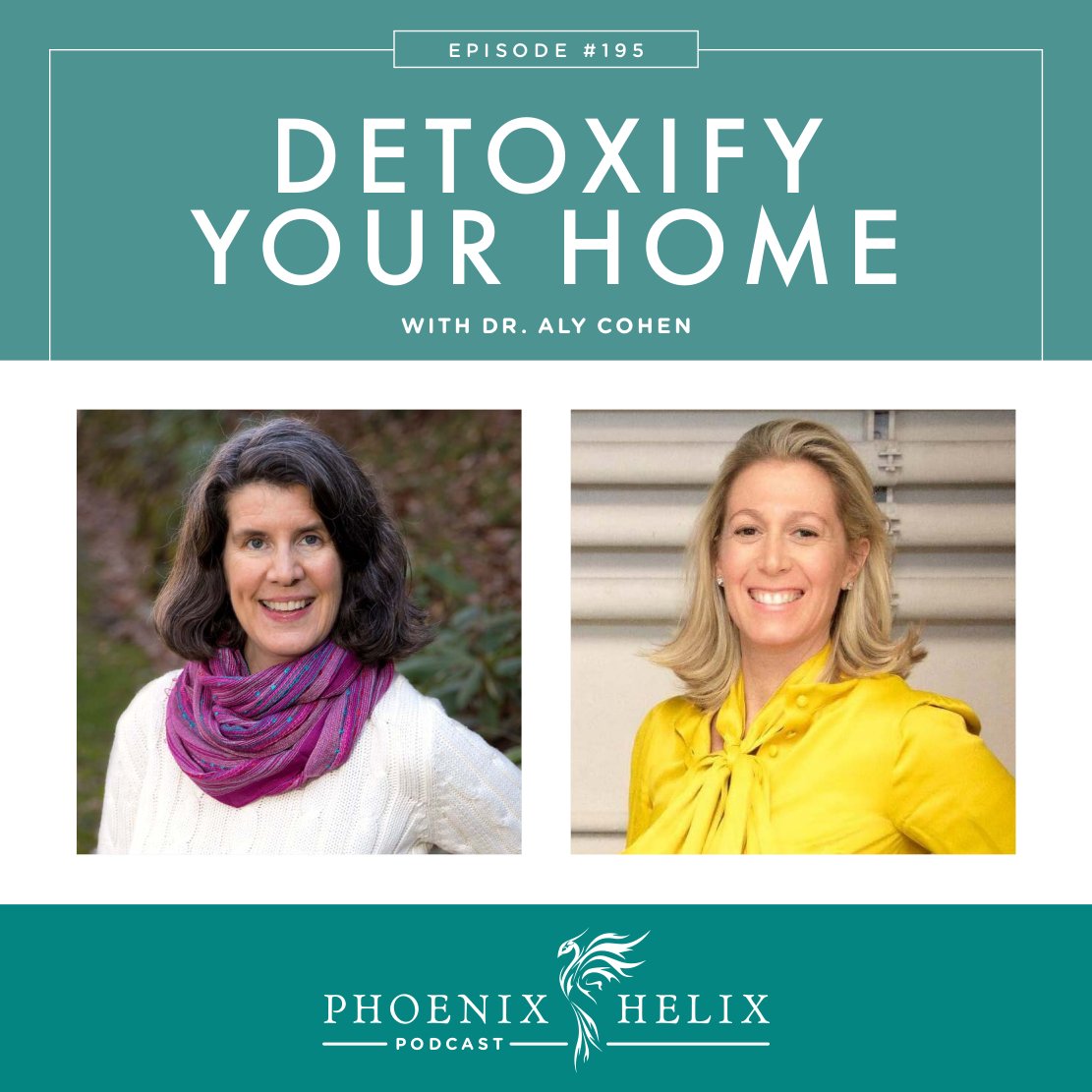
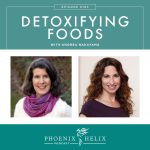
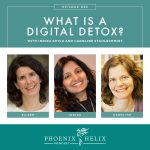
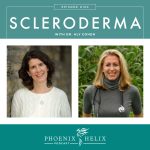
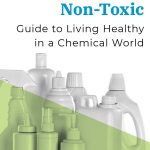

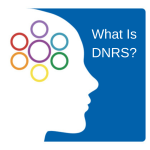

Hi! Re: toxins in cookware: I’ve been wanting to purchase an Air-Fryer but am concerned about the possible toxins emitted from the interior and basket. Aren’t they mostly plastic? (I know there are larger more expensive types that are stainless steel.) I haven’t found any definitive information about this (only speculation). What are your findings. Thank you for all you do!
Hi Jenifer. Honestly, I have avoided an air fryer for the same reasons. I did find this article which looks helpful: https://www.mamavation.com/food/safest-air-fryers-sans-toxic-pfas-coatings.html
Great article and website! Thank you! I think I’ll just steel clear for now. 😉